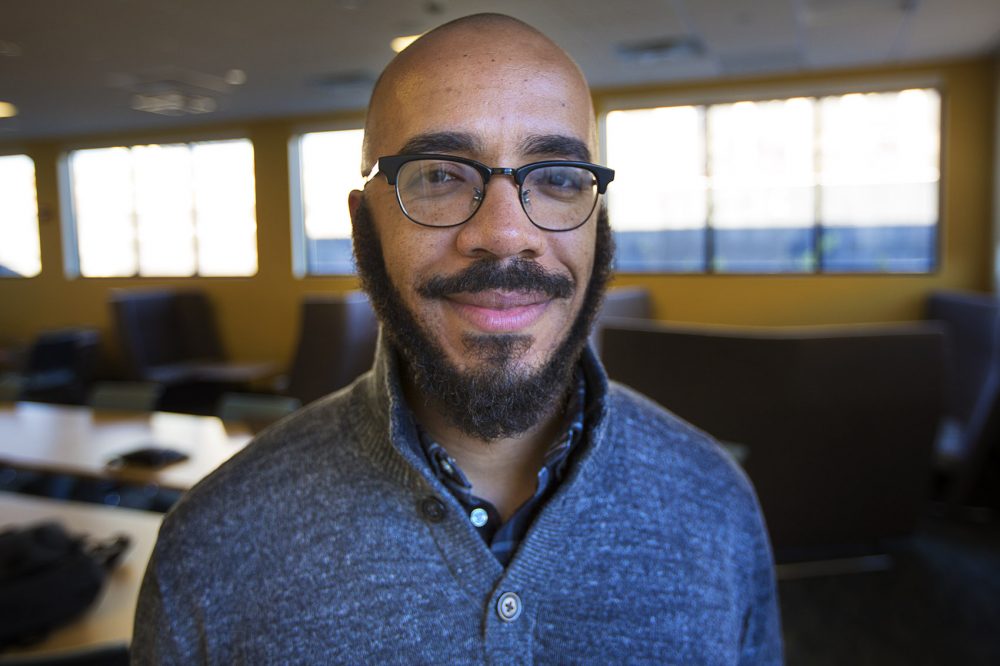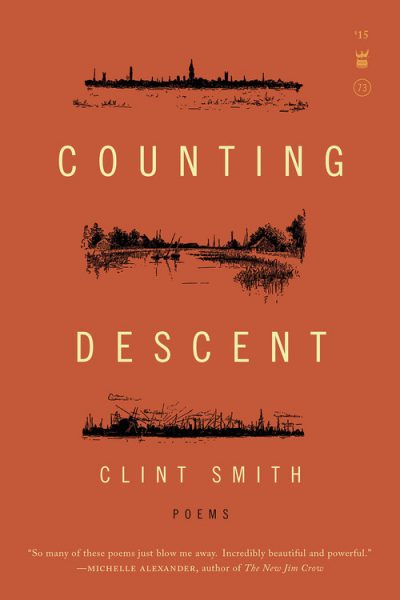Advertisement
Through Poetry And TED Talks, Clint Smith Probes Racism In America
Resume
Clint Smith (@ClintSmithIII) is the 2014 National Poetry Slam champion and has given popular TED Talks on living as an African-American man in the United States.
Earlier this fall he published his first book of poetry, "Counting Descent." He joins Here & Now's Robin Young to talk about the book.
Here is Smith's full reading of his poem "My Father is an Oyster":
And here are two of Smith's TED Talks:
Interview Highlights
On what sparked his interest in writing poetry
"I've been writing poetry seriously since about 2008, 2009. I had a summer internship in New York City, and I went to the [Nuyorican Poets Cafe], which is a famous poetry cafe on the Lower East Side of Manhattan. And so I went there and was just incredibly blown away by so much of the work that I saw, and had never been so viscerally moved by art as I had that evening. And I left, and I was kinda like, 'I don't know what this is, but I want to do it.' And so I've been writing since then.
"And then I started graduate school the same week that Mike Brown was killed [in Ferguson, Missouri]. So it was impossible for me to sort of disentangle everything that I was learning of U.S. inequality — and specifically through the lens of race — and then seeing sort of the current manifestations and residue of that history served as catalysts to write this collection. I think for me it was a means of sort of processing and humanizing and seeking to grapple with what we were seeing at that time."
On how his collection explores black parenting
"I think part of what I've been thinking a lot about — and it's reflected in this collection — is what I call the 'pedagogy of black parenting,' and what does it mean for black parents to raise their children in a world that is often taught to fear them, and how does one navigate what is the sort of marathon of cognitive dissonance that it is to grow up in a home in which you feel loved, affirmed and celebrated, and then going out into a world that has been taught to fear you, as a result of nothing that you have done to deserve it."
On how black people have impacted the U.S. while facing violence and discrimination
"To put it in historical context, the first slaves were brought to his country in 1619, the Emancipation Proclamation was signed in 1863, the Civil War ended in 1865, the Civil Rights Act and the Voting Rights Act were 1964 and 1965. And so there have only been 50 years in which black people have even had a semblance of legal and legislative freedom in this country. And for seven times longer than that — for 350 years prior — it was fundamentally legal to discriminate against, to dehumanize and to delegitimize the rights of black people in this country. And I don't think we put it in that arc of time often enough.
"But the thing is that amid all of that, amid a history in which black people have been subjected to an onslaught of incessant violence, we have still so remarkably embedded ourselves into the social and the cultural fabric of this country. And to me that's remarkable. I grew up in a home full of joy, affirmation, laughter, and I wanted to capture that as well ...we are not singularly defined by that which seeks to kill us, or that which seeks to render us obsolete."
Poems From 'Counting Descent'

By Clint Smith
Counterfactual
When I was twelve years old
on a field trip some place
I can’t remember, my friends
and I bought Super Soakers,
turned the hotel parking lot
into a water-filled battlezone.
We hid behind cars
running through the darkness
that lay between the streetlights.
Boundless laughter
across the pavement.
Within ten minutes
my father came outside
grabbed me by the forearm
and led me inside to our room—
his too-tight grip unfamiliar.
Before I could object,
tell him how foolish
he had made me look
in front of my friends,
he derided me for being so naïve.
Told me I couldn’t be out here
acting the same as these white boys—
can’t be pretending to shoot guns
can’t be running in the dark
can’t be hiding behind anything
other than your own teeth.
I know now how scared
he must have been,
how easily I could have fallen
into the empty of the night.
That some man would mistake
that water for a good reason
to wash all of this away.
Ode to the Only Black Kid in the Class
You, it seems,
are the manifestation
of several lifetimes
of toil. Brown v. Board
in the flesh. Most days
the classroom feels
like an antechamber.
You are deemed expert
on all things Morrison,
King, Malcolm, Rosa.
Hell, weren’t you sitting
on that bus, too?
You are everybody’s
best friend
until you are not.
Hip-hop lyricologist.
Presumed athlete.
Free & Reduced sideshow.
Exception & caricature.
Too black & too white
all at once. If you are successful
it is because of affirmative action.
If you fail it is because
you were destined to.
You are invisible until
they turn on the Friday
night lights. Here you are––
star before they render
you asteroid. Before they
watch you turn to dust.
My Jump Shot
My jump shot be
all elbow and no wrist.
My jump shot be
asking what a follow through is.
My jump shot be
hard to look at.
My jump shot be
Medusa.
My jump shot be
the leftovers you don’t really want to eat.
My jump shot be
the fridge that don’t work.
My jump shot be
the sour milk in your cereal.
My jump shot be
getting picked last by the other jump shots.
My jump shot be
old spaghetti.
My jump shot be
gluten-free.
My jump shot be
Michael Jordan when he was seven.
My jump shot be
spending too much time in the library.
My jump shot be
making everybody else feel better about their jump shot.
My jump shot be
asking why we didn’t stick to soccer.
My jump shot be
code-switching.
My jump shot be
making people nervous just because it’s a jump shot.
My jump shot be
the only jump shot in class.
My jump shot be
getting asked to speak on behalf of all the other jump shots.
My jump shot be
wondering why people think all jump shots are the same.
My jump shot be
explaining how jump shots come in all shapes and sizes.
My jump shot be
sounding like it’s talking about snowflakes.
My jump shot be
a snowflake.
My jump shot be
a home.
My jump shot be
the only jump shot I’ve ever had.
Excerpted from the book COUNTING DESCENT by Clint Smith. Copyright © 2016 by Clint Smith. Republished with permission of Write Bloody Publishing.
This segment aired on November 28, 2016.

